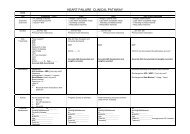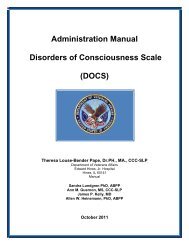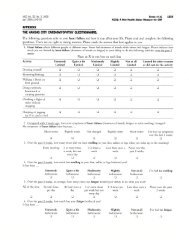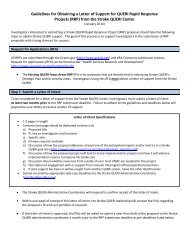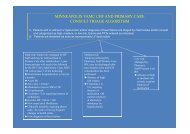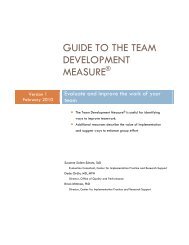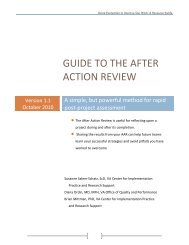The Veteran Supported Education Service Treatment Manual: VetSEd
The Veteran Supported Education Service Treatment Manual: VetSEd
The Veteran Supported Education Service Treatment Manual: VetSEd
You also want an ePaper? Increase the reach of your titles
YUMPU automatically turns print PDFs into web optimized ePapers that Google loves.
health coach or the like. Although you are not trained to provide PTSD treatment,<br />
remaining sensitive to trauma symptoms will allow you to make informed decisions on<br />
whether or not <strong>Veteran</strong>s need to be referred to specialized services to stabilize PTSD<br />
symptoms or to develop the coping skills necessary for educational success.<br />
When to Refer a <strong>Veteran</strong> for Trauma-Related <strong>Treatment</strong><br />
Peer <strong>VetSEd</strong> providers should know when to refer a <strong>Veteran</strong> on their caseload for<br />
specialized PTSD or trauma-related assessment or treatment. Key examples of such<br />
scenarios are as follows.<br />
<strong>The</strong> <strong>Veteran</strong> has emotional or behavioral problems that are consistent with PTSD<br />
(e.g., intense anger, hyper vigilance, nightmares).<br />
You suspect PTSD and has been no formal diagnostic assessment.<br />
<strong>The</strong> <strong>Veteran</strong> requests additional PTSD treatment.<br />
<strong>The</strong> <strong>Veteran</strong> struggles with alcohol or substance misuse and has a major trauma<br />
history.<br />
School personnel, family members and/or members of the supported education<br />
team notice that the <strong>Veteran</strong> is dissociating (e.g., spacing out, blank stare) in or<br />
outside the classroom.<br />
In any of these cases, we suggest that you work closely with your Clinical Supervisor to<br />
make an appropriate referral.<br />
ii.<br />
Knowing your Population: Understanding and Serving <strong>Veteran</strong>s with<br />
Traumatic Brain Injury (TBI)<br />
It is estimated that 19.5% of the nearly 1.7 million U.S. troops that have deployed to<br />
Afghanistan and Iraq since October 2001 have experienced a TBI during deployment<br />
(Tanielian, 2008). Traumatic brain injury occurs when an external force leads to a<br />
structural injury and/or physiological disruption of brain function.<br />
When this traumatic force occurs, the <strong>Veteran</strong> has likely experienced traumatic brain<br />
injury if s/he has (U.S. Department of <strong>Veteran</strong>s Affairs, 2010):<br />
100 | P a g e<br />
lost or decreased consciousness<br />
loss of memory preceding or immediately after the event<br />
confusion, slowed thinking or some other change in mental state during the injury<br />
changes in neurological functioning (e.g., change in vision, balance, speech<br />
problems, etc.) that may or may not subside



